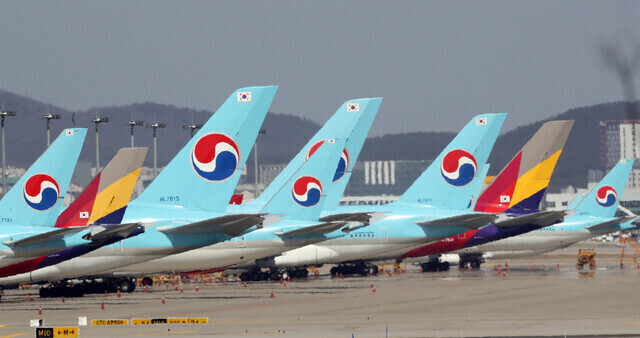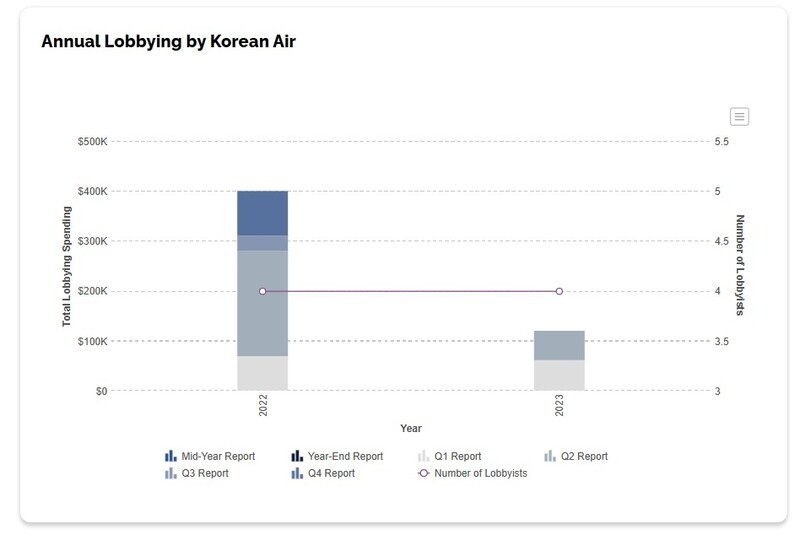hankyoreh
Links to other country sites 다른 나라 사이트 링크
Korean Air spent half a million dollars on lobbying in US over prolonged Asiana merger

With Korean Air’s integration with Asiana Airlines running into turbulence due to US and European Union regulatory authorities’ refusal to grant approval, Korean Air has spent around 700 million won to date on related lobbying efforts in the US, it has been learned.
According to the OpenSecrets website (www.opensecrets.org), a US-based political funding oversight nonprofit, Korean Air spent a total of US$520,000 on lobbying in the US between January 2022 and June 2023.
The company engaged the service of two lobbying agencies, with US$400,000 spent last year and another US$120,000 as of the end of the second quarter in 2023. No details were available on spending before that time.
The report on the lobbying funds stated only that Korean Air’s lobbying activities were related to “international aviation competition” and “supply chain security.” Major targets of lobbying included not only the US Justice Department — which is responsible for reviewing the Asiana merger — but also the Commerce Department, State Department, and White House.
Following Hanjin KAL’s decision in November 2020 to proceed with acquiring Asiana, the US Justice Department began a review in January 2021. Since then, it has reportedly expressed concerns not only about a potential monopoly not only on passenger service but also on transportation of key items such as microchips.
Among the lobbyists employed by Korean Air was Christopher Putala, who previously assisted current US President Joe Biden when the latter was serving on the Senate Judiciary Committee.
His company Putala Strategies, which has represented Korean Air as a lobbying agency, is a well-known lobbying firm in Washington. It is also seen as having gained influence under the Biden administration — with annual profits rising from US$1.3 million as of 2020 to US$4 million in 2021, for an increase of over 200%.
Korean Air’s amount of spending appears to have increased as the review of its corporate merger with Asiana has dragged on.
In the little over two years between December 2020 and February 2023, the company reported spending around 100 billion won on domestic and overseas legal costs, among other outlays. But in the US, the EU and Japan, it has failed to clear the merger approval hurdle — with roadblocks including the EU’s demands for corrective measures and the threat of legal action by the US Justice Department.
Korean Air said that it had “currently engaged a specialist law firm to pursue legal regulatory affairs duties in connection with the corporate merger approval review,” adding that it was “unable to confirm the particulars.”
Hwang Yong-sik, a business administration professor at Sejong University, explained that the company “dived into the corporate merger in a bid to strengthen the management authority of Hanjin Group Chairperson Cho Won-tae, solidify its standing as a massive airline, and help restore its image.”
“But as the review continues, Korean Air stands to face additional legal costs or miss out in terms of its strategic direction,” he warned.
“A conclusion needs to be reached within this year, at which point it can formulate its intermediate- and long-term strategy,” he suggested.

The same day, Korean Air announced provisional second quarter performance numbers. In separate terms, it recorded 3.5354 trillion won (US$2.693 billion) in sales, 468 billion won in operating profits and 371.5 billion won in net income. Sales were up by 6% compared with the same period in 2022, while operating profits and net income were down by 36% and 18%, respectively.
In comparison with the same period in 2022, passenger sales were up by 154% at 2.221 trillion won, while cargo sales were down by 56% at 963.8 billion won.
Korean Air explained, “As supply has increased, aviation and shipping costs have risen as well, resulting in somewhat lower operating profits than the same period last year.”
“With the increased normalization of passenger service, supply volumes in the cargo belly on passenger aircraft have risen while rates have fallen due to decreased air cargo demand, which has also had an impact,” it added.
By Ko Han-sol, staff reporter
Please direct questions or comments to [english@hani.co.kr]

Editorial・opinion
![[Guest essay] Preventing Korean Peninsula from becoming front line of new cold war [Guest essay] Preventing Korean Peninsula from becoming front line of new cold war](https://flexible.img.hani.co.kr/flexible/normal/500/300/imgdb/original/2024/0507/7217150679227807.jpg) [Guest essay] Preventing Korean Peninsula from becoming front line of new cold war
[Guest essay] Preventing Korean Peninsula from becoming front line of new cold war![[Column] The state is back — but is it in business? [Column] The state is back — but is it in business?](https://flexible.img.hani.co.kr/flexible/normal/500/300/imgdb/original/2024/0506/8217149564092725.jpg) [Column] The state is back — but is it in business?
[Column] The state is back — but is it in business?- [Column] Life on our Trisolaris
- [Editorial] Penalties for airing allegations against Korea’s first lady endanger free press
- [Editorial] Yoon must halt procurement of SM-3 interceptor missiles
- [Guest essay] Maybe Korea’s rapid population decline is an opportunity, not a crisis
- [Column] Can Yoon steer diplomacy with Russia, China back on track?
- [Column] Season 2 of special prosecutor probe may be coming to Korea soon
- [Column] Park Geun-hye déjà vu in Yoon Suk-yeol
- [Editorial] New weight of N. Korea’s nuclear threats makes dialogue all the more urgent
Most viewed articles
- 1Behind-the-times gender change regulations leave trans Koreans in the lurch
- 2Family that exposed military cover-up of loved one’s death reflect on Marine’s death
- 3Yoon’s revival of civil affairs senior secretary criticized as shield against judicial scrutiny
- 4Japan says its directives were aimed at increasing Line’s security, not pushing Naver buyout
- 5Unexpected rate of AI development requires timely discussion of side effects
- 6[Guest essay] Preventing Korean Peninsula from becoming front line of new cold war
- 7Marines who survived flood that killed colleague urge president to OK special counsel probe
- 8[Guest essay] Maybe Korea’s rapid population decline is an opportunity, not a crisis
- 9S. Korean first lady likely to face questioning by prosecutors over Dior handbag scandal
- 10Is Japan about to snatch control of Line messenger from Korea’s Naver?